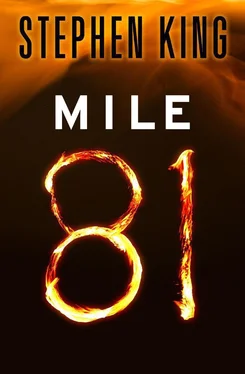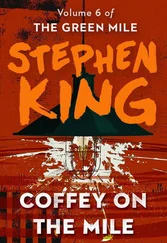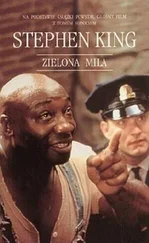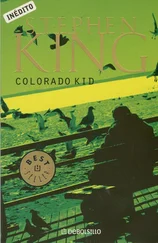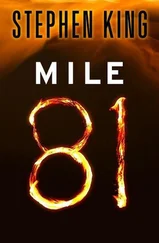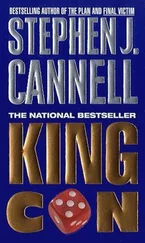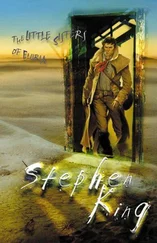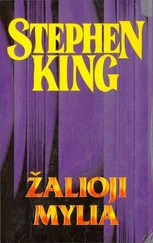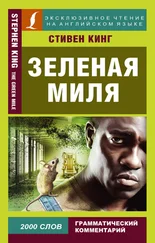At last I could stand it no longer. I was going to be early, but I didn’t care. I got into the Sunliner—which now sported two retread blackwalls to go with the whitewalls on the front—and drove the forty-odd miles to Love Field in northwest Dallas. There was no short-term or long-term parking, just parking. it cost seventy-five cents a day. I clapped my old summer straw on my head and trudged approximately half a mile to the terminal building. A couple of Dallas cops stood at the curb drinking coffee, but there were no security guards inside and no metal detectors to walk through. Passengers simply showed their tickets to a guy standing by the door, then walked across the hot tarmac to planes belonging to one of five carriers: American, Delta, TWA, Frontier, and Texas Airways.
I checked the chalkboard mounted on the wall behind the Delta counter. it said that Flight 194 was on time. When I asked the clerk to make sure, she smiled and told me it had just left Atlanta. “But you’re awfully early.”
“I can’t help it,” I said. “I’ll probably be early to my own funeral.”
She laughed and wished me a nice day. I bought a Time and walked across to the restaurant, where I ordered the Cloud 9 Chef’s Salad. it was huge and I was too nervous to be hungry—it’s not every day that a man gets to see the person who’s going to change world history—but it gave me something to pick at while I waited for the plane carrying the Oswald family to arrive.
I was in a booth with a good view of the main terminal. it wasn’t very crowded, and a young woman in a dark blue traveling suit caught my eye. Her hair was twisted into a neat bun. She had a suitcase in each hand. A Negro porter approached her. She shook her head, smiling, then banged her arm on the side of the Traveler’s Aid booth as she passed it. She dropped one of her suitcases, rubbed her elbow, then picked up the case again and forged onward.
Sadie leaving to start her six-week residency in Reno.
Was I surprised? Not at all. it was that convergence thing again. I’d grown used to it. Was I almost overwhelmed by an impulse to run out of the restaurant and catch up to her before it was too late? Of course I was.
For a moment it seemed more than possible, it seemed necessary. I would tell her fate (rather than some weird time-travel harmonic) had brought us together at the airport. Stuff like that worked in the movies, didn’t it? I’d ask her to wait while I bought my own ticket to Reno, and tell her that once we were there, I’d explain everything. And after the obligatory six weeks, we could buy a drink for the judge who had granted her divorce before he married us.
I actually started to get up. As I did, I happened to look at the cover of the Time I’d bought at the newsstand. Jacqueline Kennedy was on the cover. She was smiling, radiant, wearing a sleeveless dress with a V-neck. THE PRESIDENT’S LADY DRESSES FOR SUMMER, the caption read. As I looked at the photo, the color drained away to black and white and the expression changed from a happy smile to a vacant stare. Now she was standing next to Lyndon Johnson on Air Force One, and no longer wearing the pretty (and slightly sexy) summer dress. A blood-spattered wool suit had taken its place. I remembered reading—not in Al’s notes, somewhere else—that not long after Mrs. Kennedy’s husband had been pronounced dead, Lady Bird Johnson had moved to embrace her in the hospital corridor and had seen a glob of the dead president’s brains on that suit.
A head-shot president. And all the dead who would come after, standing behind him in a ghostly file that stretched away into infinity.
I sat back down again and watched Sadie carry her suitcases toward the Frontier Airlines counter. The bags were obviously heavy but she carried them con brio, her back straight, her low heels clicking briskly. The clerk checked them and put them on a baggage trolley. He and Sadie conferred; she passed him the ticket she had bought through a travel agency two months ago, and the clerk scribbled something on it. She took it back and turned for the gate. I lowered my head to make sure she wouldn’t see me. When I looked up again, she was gone.
Forty long, long minutes later, a man, a woman, and two small children—a boy and a girl—passed the restaurant. The boy was holding his father’s hand and chattering away. The father was looking down at him, nodding and smiling. The father was Robert Oswald.
The loudspeaker blared, “Delta’s flight 194 is now arriving from Newark and Atlanta Municipal Airport. Passengers can be met at Gate 4. Delta Flight 194, now arriving.”
Robert’s wife—Vada, according to Al’s notes—swept the little girl into her arms and hurried along faster. There was no sign of Marguerite.
I picked at my salad, chewing without tasting. My heart was beating hard.
I could hear the approaching roar of engines and saw the white nose of a DC-8 as it pulled up to the gate. Greeters piled up around the door. A waitress tapped me on the shoulder and I almost screamed.
“Sorry, sir,” she said in a Texas accent that was thick enough to cut. “Jes wanted to ask if I could get y’all anything else.”
“No,” I said. “I’m fine.”
“Well, that’s good.”
The first passengers began cutting across the terminal. They were all men wearing suits and prosperous haircuts. Of course. The first passengers to deplane were always from first class.
“Sure I can’t get you a piece of peach pah? it’s fresh today.”
“No thanks.”
“You sure, hon?”
Now the coach class passengers came in a flood, all of them festooned with carry-on bags. I heard a woman squeal. Was that Vada, greeting her brother-in-law?
“I’m sure,” I said, and picked up my magazine.
She took the hint. I sat stirring the remains of my salad into an orange soup of French dressing and watched. Here came a man and woman with a baby, but the kid was almost a toddler, too old to be June. The passengers passed the restaurant, chattering with the friends and relatives who had come to pick them up. I saw a young man in an Army uniform pat his girlfriend’s bottom. She laughed, slapped his hand, then stood on tiptoe to kiss him.
For five minutes or so the terminal was almost full. Then the crowd began to thin out. There was no sign of the Oswalds. A wild certainty came to me: they weren’t on the plane. I hadn’t just traveled back in time, I had bounced into some sort of parallel universe. Maybe the Yellow Card Man had been meant to stop something like that from happening, but the Yellow Card Man was dead, and I was off the hook. No Oswald? Fine, no mission. Kennedy was going to die in some other version of America, but not in this one. I could catch up with Sadie and live happily ever after.
The thought had no more than crossed my mind when I saw my target for the first time. Robert and Lee were side by side, talking animatedly. Lee was swinging what was either an oversized attaché case or a small satchel. Robert had a pink suitcase with rounded corners that looked like something out of Barbie’s closet. Vada and Marina came along behind. Vada had taken one of two patchwork cloth bags; Marina had the other slung over her shoulder. She was also carrying June, now four months old, in her arms and laboring to keep up. Robert and Vada’s two kids flanked her, looking at her with open curiosity.
Vada called to the men and they stopped almost in front of the restaurant. Robert grinned and took Marina’s carry-bag. Lee’s expression was . . . amused? Knowing? Maybe both. The tiniest suggestion of a smile dimpled the corners of his mouth. His nondescript hair was neatly combed. He was, in fact, the perfect A. J. Squared Away in his pressed white shirt, khakis, and shined shoes. He didn’t look like a man who had just completed a journey halfway around the world; there wasn’t a wrinkle on him and not a trace of beard-shadow on his cheeks. He was just twenty-two years old, and looked younger—like one of the teenagers in my last American Lit class.
Читать дальше
